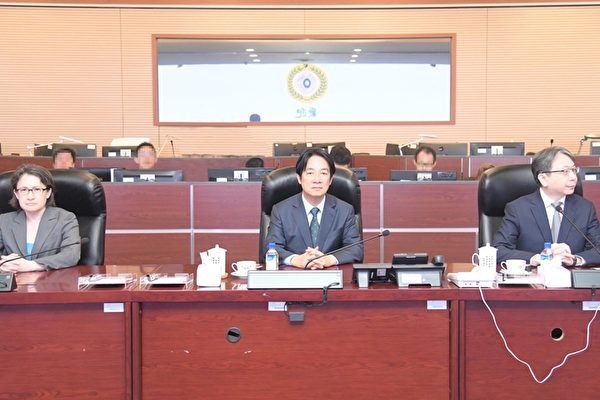Taiwan’s President-elect Lai Ching-te and Vice President-elect Hsiao Mei-chin visited the National Security Bureau today to receive a briefing on the current security situation. Lai emphasized the ongoing pressure from the Chinese Communist Party (CCP) on Taiwan through strategies such as united front operations, infiltration, sabotage, and interference in gray areas. He urged the national security team to strengthen the overall security defense capabilities in response to these threats.
The National Security Bureau released a statement today, stating that President-elect Lai Ching-te and Vice President-elect Hsiao Mei-chin visited the bureau to receive a briefing on various security issues, including the current Taiwan Strait security situation, the integration of national security units, and the bureau’s key initiatives. They discussed the direction and priorities for future national security work.
During the briefing, Director of the National Security Bureau Tsai Ming-yen emphasized that in recent years, the CCP has actively utilized diplomatic, economic, and military means to carry out diverse infiltrations globally, posing complex threats to Taiwan and escalating regional tensions. This has become a shared national security challenge faced by the international community.
Tsai mentioned that the national security team will capitalize on opportunities from democratic nations to enhance international intelligence cooperation, strengthen security control measures, and cooperation mechanisms to safeguard national security and interests.
Lai Ching-te stressed that national security work is vital for the country’s survival and development. He commended the efforts of the national security agencies and their unsung heroes who have long worked to uphold democratic constitutional systems, protect national security, and ensure social stability in collaboration with relevant government agencies to address various security challenges.
In light of the rapidly changing international environment and Taiwan’s strategic importance, particularly with the CCP’s ongoing strategies of united front operations, infiltration, sabotage, and interference in gray areas aimed at pressuring Taiwan, Lai urged the national security team to continue President Tsai Ing-wen’s efforts to maintain peace and stability in the Taiwan Strait. He emphasized the “Four Pillars of Peace” principle – establishing Taiwan’s deterrent capabilities, ensuring economic security, deepening partnerships with democratic nations, and leading with stable yet principled cross-strait relationships. This approach involves vigilant monitoring of various security threats, proactive responses to domestic and foreign challenges, and expanding strategic communication and intelligence cooperation with international allies to enhance overall national security defense capabilities.
Accompanying Lai Ching-te and Hsiao Mei-chin during the briefing were Secretary-General of the National Security Council David L.J. Tawei, Deputy Secretary-General of the National Security Council Joseph Wu, Vice Secretary-General of the National Security Council Hsu S.C., and Director of the Vice President’s Office Chen Y.L.

